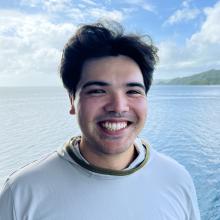
Ray Young
Tell us about your work/research. What kinds of things do you do?
I am working developing autonomous capabilities for marine robots. I am especially interested in how we can leverage ocean currents to increase efficiency, and how we can use robots to measure dynamic processes in the ocean.
What sparked your initial interest in your career?
I started out in college studying mechanical engineering without much of a focus, but quickly gravitated towards classes focused on robotics. I was able to get experience early on in a lab that exposed me to how new tools in robotics were being used to study the ocean which matched my technical interests with some really interesting real world problems.
Who influenced you or encouraged you the most?
Early on I found professors who were very positive and excited to be very influential in my pursuit of graduate school. Now my advisor, researchers in the lab, and other students are very encouraging of my own work as well as developing skills for going to sea and making observations.
What element of your work/study do you think is the most fascinating?
One of the most fascinating things to me is how complicated and intuitive the ocean can be at the same time. If you live near the coast many processes e.g. tides, waves, sea-breeze are such a natural piece of life. But sometimes studying them can uncover complexity that makes you question your understanding.
How did you get involved with the Ocean Exploration Trust?
I am participating in an OET cruise that is led by my advisor along with other members of our lab.
What other jobs led you to your current career?
My journey into oceanography was more luck than planned out. I took an elective course in college that led to an oceanography lab where I have stayed throughout grad school.
What are your degrees and certifications?
Bachelor of Science in Mechanical Engineering - University of California, San Diego 2020; Masters of Science in Mechanical Engineering - University of California, San Diego 2022; Ph.D. Oceanography (Applied Ocean Science) - Scripps Institution of Oceanography 2025 (anticipated)
What are your hobbies?
I enjoy spending time surfing and cooking. In the winter I try to go to the mountains when I can to ski.
What advice would you give someone who wants to have a career like yours?
If you want to study Oceanography in graduate school, I would recommend learning general technical skills outside of the field (e.g. math, physics, programming). Then you will be able to tackle a wide variety of problems and once you find a specific problem that grabs your interest you will be able to hit the ground running.
Expeditions
Ray participated in the following Ocean Exploration Trust expeditions:
